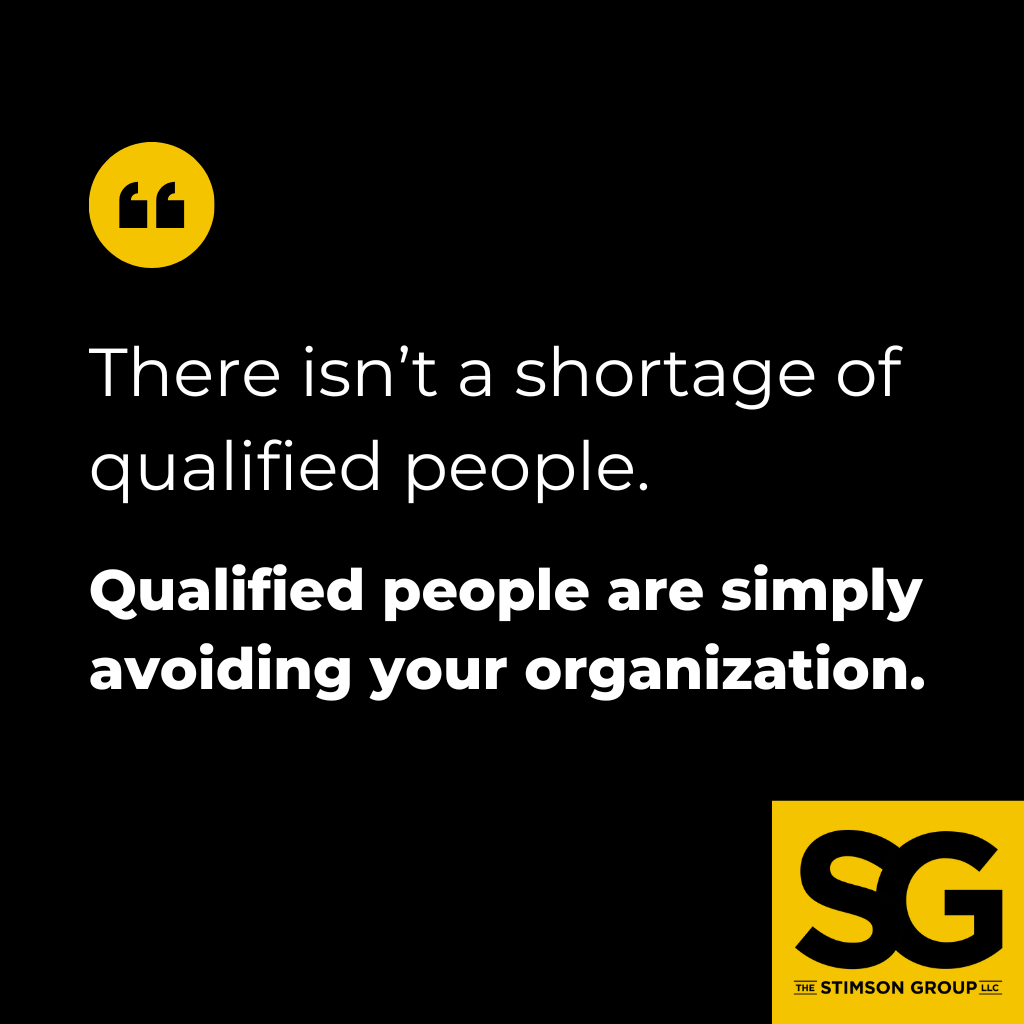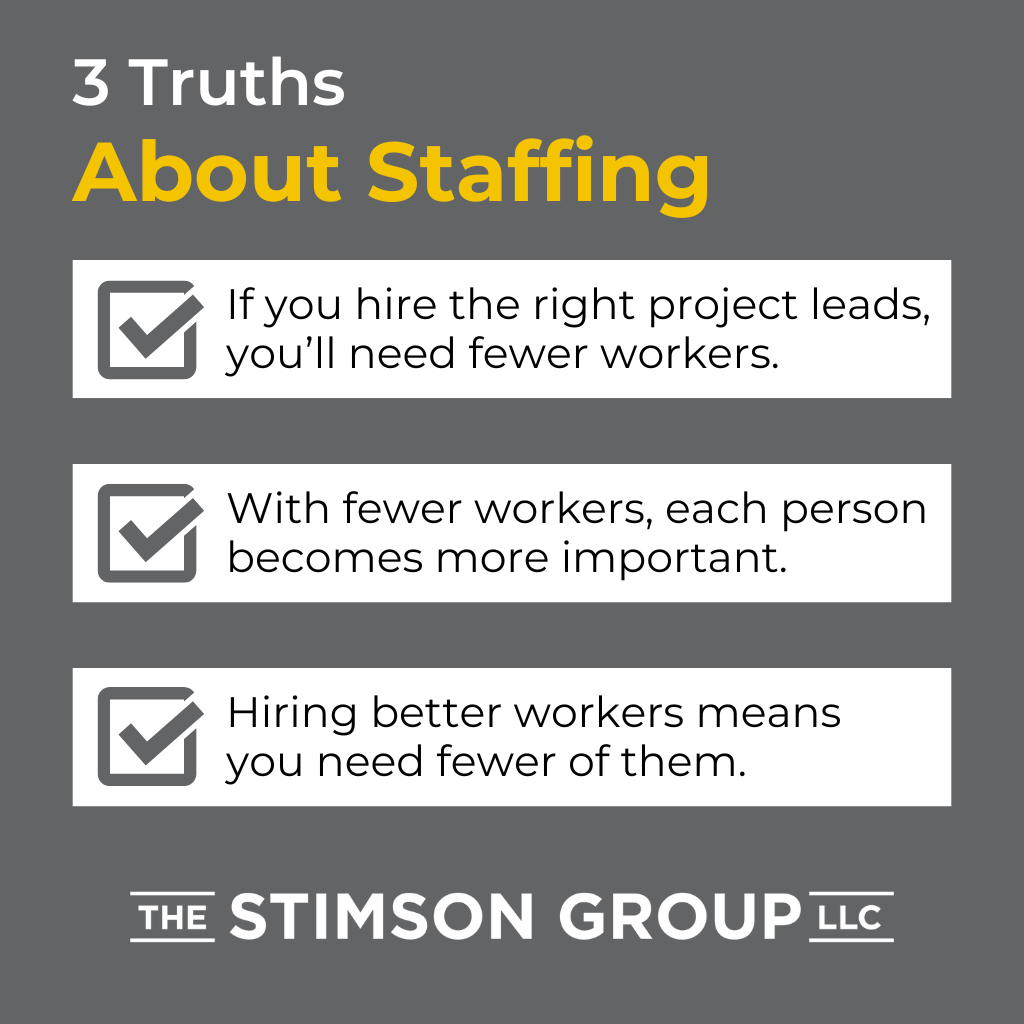
Listen instead on your Monday Morning Drive:
Scalable companies are far less likely than non-scalable companies to complain that they’re “too busy.” They accomplish more with fewer people.
How can this be?
Most companies don’t need more people. They need their current team members to do less — and to do it better. Sure, young companies experiencing 50–100% annual growth will add staff, but they don’t need to expand at the pace you might expect.
“But wait!” you cry. “There’s a labor shortage! Where will those young companies find qualified people?”
Let’s tackle a persistent myth.
The Labor Shortage Myth
Anyone who claims there’s a shortage of qualified people is likely part of the problem I’m addressing today. There isn’t a shortage of qualified people. Qualified people are simply avoiding your organization.
Staffing your projects, shows, and events is more important than finding equipment. You can source gear from anywhere, but finding the right people requires skill.
Recruiting is your most critical responsibility — the one task that guarantees success above all others.
All the meticulous planning, equipment testing, and gear sourcing in the world won’t fix a bad crew. People are your most valuable asset.
So, why do the companies that complain about being “too busy” also neglect the mission-critical task of finding, recruiting, hiring, and supervising good people?

The Restaurant Kitchen Parallel
Consider a chef who can prepare dinner for 20 people by herself in two hours. Could she double her output by adding another chef? Certainly. Two chefs could prepare 40 meals, each handling 20.
But what about dinner for 100? Would you hire five chefs and have each independently create 20 meals? That would be wasteful, inefficient, and expensive, since chefs are the highest-paid kitchen staff.
Instead, the chef would likely hire assistants — perhaps a sous chef, line cooks, and prep cooks. These people would focus on specific tasks. As the team grows, each person’s focus becomes more specialized.
But if the chef must supervise all these people, she’ll neglect other responsibilities. More workers don’t automatically make life easier. The quality of supervision matters.
Sometimes, you really need another manager. Imagine executing your biggest show of the year with only your best production manager available to supervise. Despite his skill, it would be chaotic and difficult.
What if you added a second production manager working under the first? What if you doubled the amount of supervision?
Your production manager likely needs an assistant — one who isn’t “dicing onions,” but making sure each show runs as planned.
The Time-Suck of Poor Management
One of my coaching clients, the owner of a growing company, kept hiring people because his staff seemed busy constantly putting out fires.
All these people became his time-suck. He was no longer the chef. He spent all day, every day answering questions, handling behavior issues, and fixing mistakes. He stayed late to do their work himself because that’s the only way it would get done correctly.
He came to me asking why he was so stressed. I looked at his new wrinkles and pointed out, “You’ve got too many people. You’re spending all your time supervising. Focus on the people who make a difference — who would work without being asked if they understood the expected result.”
This insight changed his life. He reduced staff by nearly 50% overnight, and the quality and quantity of work immediately improved.
Two factors were at play here:
- Each person has a limit to how many others they can effectively supervise.
- Unqualified people — untrained, lacking aptitude, or with poor attitudes — make everyone feel busier.
The frustration of compensating for poor workers demoralizes the entire team. There’s no shortage of good workers. There’s a shortage of good supervisors.
The Scalable Business Approach
In a scalable business, employees contribute at their highest and best use of skills and aptitude most of the time. There’s no room for marginal contributors or people who don’t understand their contribution level.
Personnel aren’t added just to fill a process gap. The best workers are eager to stay busy, learn, and complete tasks that match their experience.
We’ve all worked with project managers who can’t delegate — stagehands standing idle while the project manager tapes down cables. Why? “It’s easier for me to do this than explain what I want done.”
That indicates poor management skills.
For the same reason a chef doesn’t need to dice onions for 500 meals, a project manager’s job is to enable everyone else to focus on their roles.
Focus on Outcomes, Not Process
To solve the “too busy” problem, focus on outcomes rather than process.
Event designers are like chefs — they create the vision of the finished product and set the standard for quality. They won’t necessarily tell you how to get there.
Production managers oversee teams of project managers or department leads, just as sous chefs run teams of line chefs. Everyone knows their responsibilities and works from a clear plan.
In professional kitchens, this command structure is sacred. In the event world, we have similar structures, but many people haven’t been trained in their proper function. Production managers who don’t understand their roles take on too much detailed work, which causes their teams to lose focus.
Chaos follows, fingers point, and suddenly, people insist, “We need more help!” and “We’re too busy!”

Three Truths About Staffing
- If you hire the right project leads, you’ll need fewer workers.
- With fewer workers, each person becomes more important.
- Hiring better workers means you need fewer of them.
“Too busy” is a symptom of poor staffing, which stems from poor planning, which comes from poorly defined outcomes. In other words, “too busy” starts at the top — owners and managers who fail to clearly define outcomes and let people do their jobs. Micromanagement creates the “too busy” syndrome.
When all three circumstances exist — poor staffing, poor planning, and poorly defined outcomes — you move from crisis to crisis. This becomes your company culture, and you’ll pray for the downtime you need to catch your breath and clean up the warehouse.
The Staffing Solution
How do we fix this? Start here:
- Be totally transparent about what every finished product should look like. Don’t assume everyone shares your standards or that every purpose is obvious. Don’t just communicate what to do — communicate why.
- Define the tools, support, and personnel needed to achieve every outcome. Be specific about resources, timeframes, and priorities.
- Don’t settle for people that don’t anticipate your instructions. They aren’t right for the job, which means you’ll end up doing both their job and yours.
There isn’t a labor shortage. There’s a shortage of qualified people to specify, recruit, and schedule the highly qualified labor that’s needed for your particular brand of chaos.
Highly qualified labor is out there, but you need to become a better company before they choose to work with you.





Leave a Reply